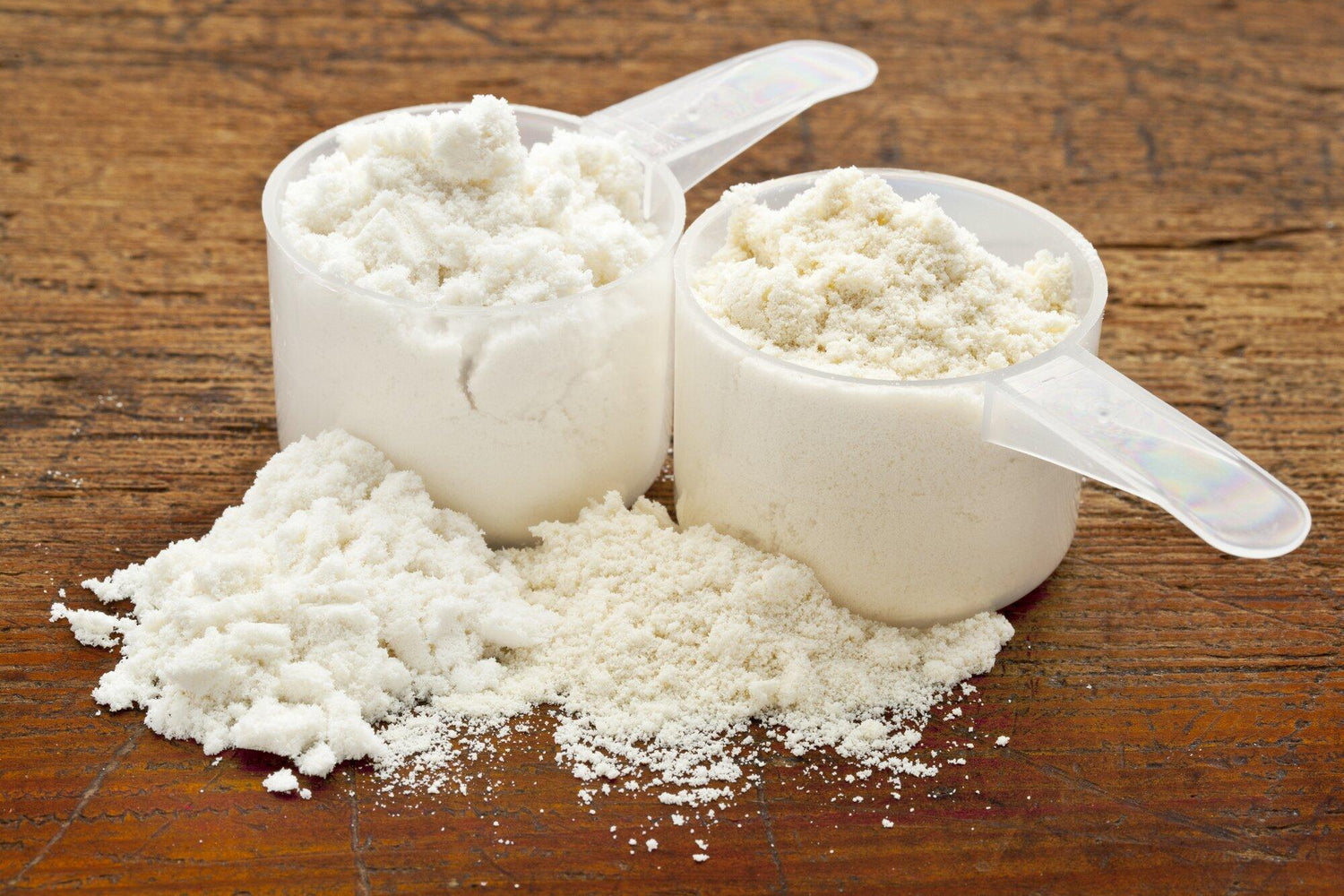Finding the right protein supplement can feel like navigating a maze with a blindfold on, especially if you're one of the many grappling with the discomfort of lactose intolerance. The quest for muscle gain, recovery speed, and overall health improvement often leads fitness enthusiasts and those with dietary restrictions to the protein aisle, where whey protein reigns supreme.
But does whey protein have lactose? The short answer is yes, but don't let that dampen your spirits just yet. This article will guide you through the complexities of whey protein and its lactose content.
Whether you're trying to sidestep gastrointestinal woes or simply aiming to refine your nutritional regimen, the insights gathered here promise to equip you with the knowledge to make empowered choices. Stay with us as we go deeper into understanding how whey protein fits into a lactose-sensitive lifestyle and discover alternatives that don't force you to compromise on your fitness or health goals.
Does Whey Protein Have Lactose?
Whey protein is a popular supplement among those looking to improve their fitness levels, gain muscle, or lose weight. It's derived from milk during the cheese-making process.
Whey protein comes in three main types:
- Whey protein concentrate
- Whey protein isolate
- Hydrolyzed whey protein
Each type has a different processing level, affecting the lactose content, protein concentration, and digestion rate.
Whey protein concentrate is the least processed form. It contains the highest levels of lactose which makes it less suitable for those who are lactose intolerant. This type of whey protein is a dairy product that keeps more of its natural nutrients, including a small amount of fat and carbohydrates, alongside protein.
On the other hand, whey protein isolate undergoes further processing to remove most of the lactose and fat. This results in a higher protein content by weight which makes it a better option for those looking to minimize lactose intake without sacrificing their protein needs.
Hydrolyzed whey protein, also known as hydrolysate, is the most processed form. The whey protein is pre-digested, breaking down the amino acids into smaller segments.
Impact of Lactose for Individuals
Lactose intolerance affects a significant portion of the population. This makes it a common concern when choosing dietary supplements, especially protein powders.
The condition stems from the body's inability to produce enough lactase, the enzyme needed to digest lactose, a sugar found in milk and dairy products. When lactose moves through the digestive system without being properly broken down, it can lead to various uncomfortable symptoms.
The symptoms of lactose intolerance can vary in severity from person to person but commonly include:
- Bloating
- Gas
- Diarrhea
- Stomach cramps
These symptoms often start from 30 minutes to 2 hours after consuming foods or drinks containing lactose. For those who are lactose intolerant, consuming protein powders that contain lactose can trigger these symptoms, leading to discomfort and disrupting daily activities and workout routines.
It's worth noting that not all protein powders are created equal when it comes to lactose content. Some powders, especially those derived from whey concentrate, can contain higher levels of lactose, while others, such as whey protein isolate or plant-based proteins, are much lower in lactose or completely lactose-free.
Exploring Alternatives to Traditional Whey Protein
For those who find traditional whey protein doesn't suit their dietary needs there are several high-quality alternatives available. These alternatives offer the same, if not better, nutritional benefits without the discomfort associated with lactose.
Lactose-Free Whey Options
Whey protein isolate undergoes a more intensive filtering process compared to whey concentrate, removing most of the lactose. This makes it an excellent alternative for those who are lactose intolerant but still want to benefit from the muscle-building properties of whey protein. Whey isolate is typically more than 90% protein, offering a high-quality source without the added lactose.
Hydrolyzed whey protein is pre-digested, breaking down the proteins into smaller peptides. This process not only reduces the lactose content but also makes it easier for the body to absorb the protein. It's ideal for post-workout recovery as it provides a quick source of protein to the muscles when they need it the most.
Plant-Based and Other Non-Dairy Protein Alternatives
Vegan protein powders have risen in popularity as a viable alternative to whey protein. Made from sources like pea, rice, hemp, and soy, these plant-based proteins offer a complete amino acid profile for muscle repair and growth. They are naturally lactose-free which makes them an excellent choice for those with lactose intolerance or those following a vegan lifestyle.
Other non-dairy proteins include egg white protein and collagen protein. Egg white protein is a high-quality, lactose-free option that's rich in essential amino acids.
Collagen protein, derived from animal connective tissues, is another alternative that supports joint health and skin elasticity, in addition to providing protein for muscle growth.
Finding Your Perfect Protein Match
Selecting the right protein supplement is crucial for meeting your dietary and fitness goals. It's not just about picking any protein off the shelf. It's about finding the one that aligns with your body's needs, your dietary restrictions, and your taste preferences.
Consider Your Dietary Needs
For those with specific dietary restrictions such as lactose intolerance, choosing a protein that supports your digestive health while providing the necessary nutrients is essential. Protein in whey products, for example, varies significantly in lactose content.
Identifying whether you need a whey protein isolate, a lactose-free vegan option, or a hydrolyzed formula can make all the difference in how your body responds to supplementation.
Align With Your Fitness Goals
Are you looking to build muscle, lose weight, or simply maintain a healthy diet? The type of protein you choose should reflect your fitness goals. Whey protein is renowned for muscle building due to its high amino acid content, while plant-based proteins might be preferable for those seeking a more holistic approach to health and wellness.
Flavor and Mixability
Taste is a significant factor for many when choosing a protein powder. Fortunately, there's a wide range of flavors available, from classic chocolate and vanilla to more adventurous options like salted caramel or mocha.
Mixability is also important. A powder that blends smoothly into your favorite beverage or recipe can make taking your daily protein a pleasure rather than a chore.
Read the Label
Understanding what's in your protein powder is vital. Check for added sugars, artificial ingredients, and the protein content per serving. A high-quality protein supplement will have a short and straightforward ingredient list, highlighting the purity of the protein source.
Making Protein Supplements Work for You
Adding protein supplements to your diet can boost your fitness results, help in muscle recovery, and support your overall health goals. However, it's essential to integrate these supplements into your daily routine in a way that complements your lifestyle and dietary needs.
Timing Is Everything
The timing of your protein intake can play a critical role in its effectiveness. Consuming protein after a workout, for example, can aid in muscle recovery by providing the necessary building blocks for muscle repair.
This is often referred to as the "anabolic window," a period shortly after exercise when your body is most receptive to nutrients. Aim for a protein shake or a snack with protein within 30 to 45 minutes post-workout.
How Much Do You Need?
Understanding the right serving size of protein is crucial. Generally, it's recommended to consume about 0.8 to 1 gram of protein per kilogram of body weight per day for the average person.
However, this amount increases for those actively engaging in strength training or endurance sports. A serving of protein powder typically contains 20 to 25 grams of protein which aligns well with these guidelines when added to a balanced diet.
Blend It Into Your Daily Diet
Protein supplements can easily blend into your daily meals beyond the traditional shake. Add whey permeate, a byproduct of cheese production with a high protein content, into smoothies, oatmeal, or homemade protein bars for an extra protein boost. This not only enhances the protein content of your meals but also helps you enjoy the variety in how you consume your protein.
A Balanced Diet Is The Key
While protein supplements are beneficial, they should not replace whole food sources of protein and nutrients in your diet. Incorporating a variety of protein sources, including lean meats, dairy, legumes, and nuts, ensures you receive all essential amino acids and nutrients.
Think of supplements as part of a balanced diet that supports your overall health and fitness goals, not as the sole source of your nutrition.
The Perfect Blend for Your Goals
Does whey protein have lactose? The short answer is yes but in this article, we've explored different whey forms and ways to identify lactose-friendly alternatives.
Dietonsale.com stands by to support you with a range of lactose-free and low-lactose options to ensure you don't have to compromise on quality or taste. Our commitment to your health and satisfaction shines through our carefully selected products, free fast shipping on orders over $75, and top-notch customer support.
Explore our full range today and take a step towards achieving your health and wellness goals.




Leave a comment
This site is protected by reCAPTCHA and the Google Privacy Policy and Terms of Service apply.